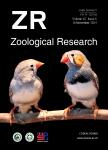Targeting lentiviral vectors to primordial germ cells(PGCs):An efficient strategy for generating transgenic chickens
Targeting lentiviral vectors to primordial germ cells(PGCs): An efficient strategy for generating transgenic chickens作者机构:College of Biological SciencesChina Agricultural UniversityBeijing 100094China State Key Laboratory of Agro-BiotechnologyChina Agricultural UniversityBeijing 100094China
出 版 物:《Zoological Research》 (动物学研究(英文))
年 卷 期:2020年第41卷第3期
页 面:281-291页
核心收录:
学科分类:0710[理学-生物学] 07[理学] 0905[农学-畜牧学] 09[农学] 071007[理学-遗传学] 090501[农学-动物遗传育种与繁殖]
基 金:the National Transgenic Breeding Project of China(2016ZX08009003006) National Natural Science Foundation of China(31672411) Discipline Innovative Engineering Plan(B12008)
主 题:M168-pseudotyped lentiviral vectors Primordial germ cells Targeted transduction Transgenic chickens SSEA4
摘 要:Recent advances in avian transgenic studies highlight the possibility of utilizing lentiviral vectors as tools to generate transgenic chickens. However, low rates of gonadal chimerism and germ line transmission efficiency still limit the broad usage of this method in creating transgenic chickens. In this study, we implemented a simple strategy using modified lentiviral vectors targeted to chicken primordial germ cells(PGCs) to generate transgenic chickens. The lentiviral vectors were pseudotyped with a modified Sindbis virus envelope protein(termed M168) and conjugated with an antibody specific to PGC membrane proteins. We demonstrated that these optimized M168-pseudotyped lentiviral vectors conjugated with SSEA4 antibodies successfully targeted transduction of PGCs in vitro and in vivo. Compared with the control, 50.0%–66.7% of chicken embryos expressed green fluorescent protein(GFP) in gonads transduced by the M168-pseudotyped lentivirus. This improved the targeted transduction efficiency by 30.0%–46.7%. Efficient chimerism of exogenous genes was also observed. This targeting technology could improve the efficiency of germ line transmission and provide greater opportunities for transgenic poultry studies.



